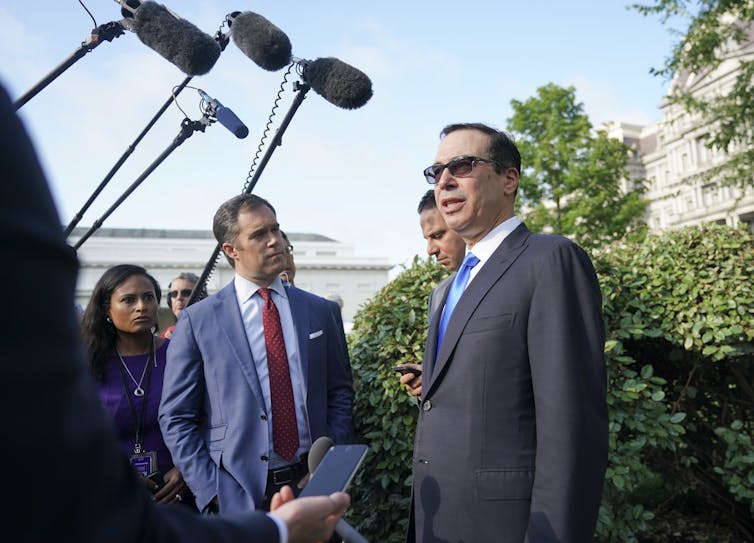Why adjusting capital gains for inflation makes economic sense
The Trump administration is considering a change to how capital gains taxes are calculated that would save investors roughly $100 billion over a decade.
The Trump administration is considering a significant change to the way capital gains on investments like stocks, businesses and real estate are calculated.
The administration wants to allow investors to use inflation when determining the gain they get when they sell an asset, which would usually mean reducing the profit – as reported to the IRS – and thus the amount that’s taxable. Based on what is known about the plan, it would reduce taxes by about US$100 billion over 10 years.
I’ll let others debate the implications for certain taxpayers and the impact it would have on the federal deficit. Instead, I’ll focus on why the proposal to adjust capital gains for inflation is a good one, the rationale for which has been argued by financial economists – including me – for decades.
Capital gains and inflation
Treasury Secretary Steve Mnuchin recently told The New York Times that his department is studying a regulatory change that would allow taxpayers to use inflation – or the change in the price of goods and services over time – in determining how much they owe when they sell an asset that has increased in value.
Capital gains work like this. Let’s say you bought a stock five years ago for $100. Today you sell it for $150. Based on current rules, you’d have a long-term capital gain of $50, which would then be taxable at a rate as high as 20 percent. Gains on assets sold less than a year after purchase are taxed at individual rates.
Under the proposed change, you could adjust the initial price, or basis, by the effect of inflation over that five years. The basis would thus rise to $108, reducing the gain to $42 and lowering the tax owed as well.
Adjusting a financial “gain” for the effects of inflation is nothing new. In the late 1940s, unions were among the first to advocate for automatic adjustments to an income or other recurring payment. In their case, they wanted members’ wages adjusted for inflation every year to preserve their purchasing power.
Since then, so-called cost of living adjustments have been applied to a variety of financial payments, such as rents, Social Security benefits and royalties.

Why extending this to gains makes sense
So why not do the same for capital gains?
Let’s look at our example again. The effects of inflation mean you need $108 today to get the same purchasing power as $100 had in 2013. But let’s say instead of a sale price of $150, you can only get $109 for the stock. Under current rules, that would be a taxable profit of $9. But the real or inflation-adjusted profit, factoring in actual purchasing power, is only $1.
At a capital gains tax rate of 15 percent, that would mean Uncle Sam would take $1.35, and you’d be 35 cents poorer than you started.
The data suggest this is a big problem. A study of the impact of inflation on capital gains in 1978 by economists Martin Feldstein and Joel Slemrod showed that $4.5 billion in nominal capital gains on corporate stock in 1973 became a real loss of almost $1 billion.
Some countries such as the U.K. and Ireland already adjust capital gains taxation for inflation. A study by economist Barry Bracewell-Milnes found that its use reduced the “burden and inefficiencies” of capital gains taxes, which he argued are economically damaging because they yield little revenue yet create many administrative and compliance costs.
The benefits of adjustment is greatest, of course, when inflation is especially high, as it was in the U.K. around the time it introduced indexing. While inflation has been fairly low in the U.S. for decades, it soared in the 1980s and could climb again.
As for the broader impact on U.S. tax policy, John Rico, a senior analyst at the Penn Wharton Budget Model initiative, concluded that even though indexing capital gains to inflation would accrue mainly to the top 1 percent of earners, it would not meaningfully alter the distribution of the tax burden.
All in all, I believe it makes a lot of economic sense to index capital gains to inflation. By acknowledging that inflation does in fact change the economic value of these gains, this would optimize investment decisions by encouraging more long-term planning and help the economy run more efficiently. It would also, in a small way, discourage short-term thinking – something I’ve fretted about in the past.
Dale O. Cloninger does not work for, consult, own shares in or receive funding from any company or organisation that would benefit from this article, and has disclosed no relevant affiliations beyond their academic appointment.
Read These Next
Housing First helps people find permanent homes in Detroit − but HUD plans to divert funds to short-
Detroit’s homelessness response system could lose millions of dollars in federal funding for permanent…
When unpaid cooking, cleaning and child care get a dollar value, income inequality in the US shrinks
Women’s unpaid work at home has declined much more than men’s contributions have increased.
Far from random, China’s global port network is clustering near the world’s riskiest trade routes
A review of 133 countries’ ports found a correlation between investment from China and proximity to…






